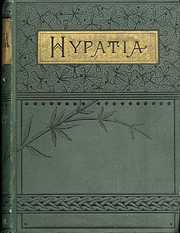

Pulse en una miniatura para ir a Google Books.
|
Cargando... Hypatia (1853)por Charles Kingsley

Actualmente no hay Conversaciones sobre este libro. For a book that started so well, I was mightily disappointed with the progression and ending of this one. Charles Kingsley does a good job showing the corruption of the catholic church in the 5th century but he completely gets Hypatia wrong. Being a christian he is obsessed with belief, and I think the whole point is that Hypatia's life was devoted to mathematics and astronomy, to finding proofs for reality rather than justification for belief. He has her completely frazzled because she can't convince any of the gods, particularly Appolo or Aphrodite to manifest themselves to her. She is lead astray by the men in her life because she will do anything to get the people to return to worshiping the gods she adors. He even uses the most interesting character in the book, Raphael Oben-Ezra, a skeptical Jew who converts to christianity because he falls in love with a pure woman, to use logic to convince Hypatia that Jesus is god. Then he throws in what is supposed to be a lovely miracle at the end. He also flits over the destruction of the library at Alexandria. Pity. Hypatia is a dark, religious, philosophic, and historical novel, bearing a warning in its preface to potential readers of its tragic content. It is set mainly in Alexandria, in the fourth and fifth centuries A.D., at a time when the city was a centre for academia. Hypatia is pagan, believing in the classical gods, and their tradition, but she is a scholar also, teaching and studying philosophy and mathematics, searching for truth. She is also virtuous, and despite her pagan ways is marked out above the rest of the citizens, Christian, Jewish, and the other pagans, who admire her for her numerous qualities. The story deals with the strife between the early church, the pagans, the Roman Empire, and other citizens of Alexandria. There are several politcal and religious conflicts, amongst which Hypatia must try to do the right thing. The book has plenty of messages in it, and a sad end, but there are happy parts too, and it is exciting in places, as well serious. The story is based mainly on real characters, and loosely on historical events, but of course is partly invention to make it an interesting and complete story. sin reseñas | añadir una reseña
Contenido enContieneAparece abreviada enOne hundred best novels condensed: 3 of 4 see note: Adam Bede; Tess of the D'Urbervilles; Don Quixote; East Lynne; Count of Monte Cristo; Paul and Virginia; Tom Brown's School Days; Waverley; Dombey and Son; Romola; Legend of Sleepy Hollow; Last of the Mohicans; Wreck of the "Grosvenor"; Right of Way; Coniston; Far from the Madding Crowd; Woman in White; Deemster; Waterloo; Hypatia; Kidnapped; Oliver Twist; Gil Blas; Peg Woffington; Virginians por Edwin Atkins Grozier
In the four hundred and thirteenth year of the Christian Era, some three hundred miles above Alexandria, the young monk Philammon was sitting on the edge of a low range of inland cliffs, crested with drifting sand. No se han encontrado descripciones de biblioteca. |
Debates activosNingunoCubiertas populares
 Google Books — Cargando... Google Books — Cargando...GénerosSistema Decimal Melvil (DDC)823.8Literature English & Old English literatures English fiction Victorian period 1837-1900Clasificación de la Biblioteca del CongresoValoraciónPromedio: (3.38) (3.38)
¿Eres tú?Conviértete en un Autor de LibraryThing. |
||||||||||||||||||||||||||||||||||||||||||||||||||||||||||||||||||||||||||||||||||||||||||||||||||||||||||||||||||||||||||
Hypatia, the late Roman-era Alexandrian mathematician, is often called an early female scientist, so it seemed like it behooved me to read the novel about her by Charles Kingsley, a man who did write two proper "scientist novels" (Two Years Ago and The Water-Babies). In terms of my project on Victorian scientists, I needn't've bothered. Hypatia as Kingsley tells it might be a mathematician and a philosopher, but she is no scientist-- she is never shown observing the world or engaging in experiment. Mostly the focus is (as in the above quotation, from a young Christian monk who wants to study under her) on her moral instruction.
In terms of reading a good book, I needn't've bothered, either. It was supposedly Queen Victoria's favorite Kingsley novel, which surely correlates to why I dislike it: it's boring and rambly and Kingsley never really makes anyone who doesn't care about hating Catholics care about what's going on. There are a couple good jokes (I don't know why he threw a gang of murderous Vikings into the mix, but I love it), but on the whole, it's one of those books where masses of pages go by and you don't know what's printed on them because you don't care to. This could be the material for a good novel, but alas, it is not.